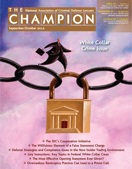September/October 2012

There are six key issues where the court’s instructions to the jury can affect the outcome of a case and where there is much room for advocacy.
Articles in this Issue
-
Affiliate News
Affiliate News Gerald Lippert Affiliate News September/October 2012 06 2012-2013 NACDL & Affiliate CLE Calendar November 9-10 Pennsylvania: PACDL’s 2012 White Collar Practice Seminar Ritz Carlton Hotel, Philadelphia, Pennsylvania Contact: PACDL Executive Director Debra H. McGovern
-
Defense Strategies and Compliance Issues in The New Insider Trading Environment
Defense Strategies and Compliance Issues in The New Insider Trading Environment Cheryl A. Krause September/October 2012 46 With the perspective that nearly three years brings, it is now possible to look back upon the wave of insider trading prosecutions and enforcement actions during this period
-
From the President: The Truth Be Told: The Criminal Defense Lawyer and the Importance of Truth
Should criminal defense lawyers seek the full, unbiased, and truthful disclosure of facts from their clients within the confidentiality of the attorney-client relationship?
-
Jury Instructions: Key Topics in Federal White Collar Cases
Jury Instructions: Key Topics in Federal White Collar Cases Susan E. Brune and Laurie Edelstein September/October 2012 26 The right jury charge can make the difference between conviction and acquittal. Take, as a basic example, a criminal securities fraud case in which the government has alleged t
-
Let Counsel Beware: Overzealous Bankruptcy Practice Can Lead To a Prison Cell
Let Counsel Beware: Overzealous Bankruptcy Practice Can Lead To a Prison Cell Joel M. Shafferman September/October 2012 58 Bankruptcy cases and criminal prosecutions are close cousins. Desperation is a hallmark of both. White collar practitioners, in particular, often deal with clients forced i
-
NACDL News: Court: Guantánamo Detainees Retain Right to Legal Counsel
NACDL News: Court: Guantánamo Detainees Retain Right to Legal Counsel Jack King and Ivan J. Dominguez NACDL News September/October 2012 24 On Sept. 6, 2012, Chief Judge Royce Lamberth of the U.S. District Court for the District of Columbia issued an order upholding Guantánamo detainees’ access to
-
NACDL News: Khadr Repatriated to Canada
NACDL News: Khadr Repatriated to Canada Jack King and Ivan J. Dominguez NACDL News September/October 2012 24 The Pentagon and the Canadian government announced that Canadian and former Taliban child soldier Omar Khadr was repatriated from the Guantánamo Bay detention center to Canada on Sept. 29,
-
Reviews in Review
Reviews in Review Ellen S. Podgor Reviews in Review September/October 2012 45 Corporate Criminal Liability This symposium issue on corporate criminal liability, in Volume 41 of the Stetson Law Review , comes from a discussion group at the Southeastern Association of Law Schools (SEALS). Each p
-
The Most Effective Opening Statement Ever Given?
The Most Effective Opening Statement Ever Given? Christopher R. Hall September/October 52 In January 2012, a team of defense attorneys treated white collar practitioners to what may have been the most effective opening statements ever given in the prosecution of a business organization. 1 The te
-
The SEC’s Cooperation Initiative — Nearly Three Years Later, What’s the Deal?
The SEC’s Cooperation Initiative — Nearly Three Years Later, What’s the Deal? William A. Haddad September/October 2012 18 On January 13, 2010, Robert Khuzami, the Securities and Exchange Commission’s (SEC) Director of Enforcement, enthusiastically announced the SEC’s new Cooperation Initiative (t
-
The Willfulness Element of a False Statement Charge
The Willfulness Element of a False Statement Charge Paul Mogin September/October 2012 38 Defense lawyers and civil liberties lawyers have long recognized the risk of unfairness and overreaching posed by 18 U.S.C. § 1001, the federal false statement statute. 1 Recently, however, concern about § 1
-
When It Comes to Overcriminalization, Prosecutorial Discretion Is for the Birds (Inside NACDL)
Overcriminalization includes many troubling trends: overlapping criminal provisions, inadequate definition of what conduct is criminal, the erosion of intent requirements, and excessive penalties.
